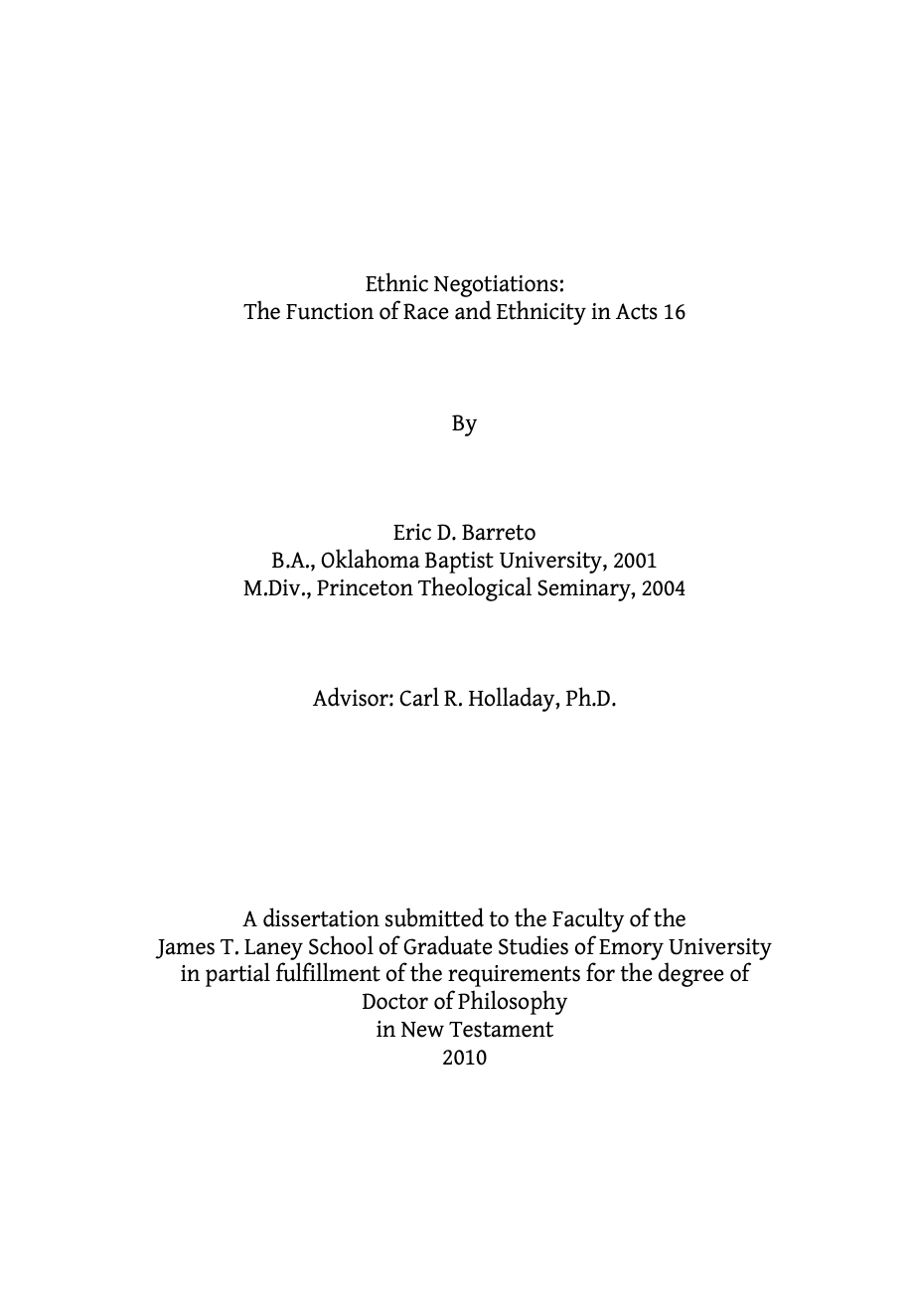Biblical scholarship has recently begun to explore the complex notions of race and ethnicity. However, the book of Acts has not received the full attention of such efforts. Focusing on Acts 16--a chapter teeming with the language and discourse of ethnicity--this dissertation inquires as to the function of ethnic identities in Luke's composition. After developing a working definition of ethnicity, the dissertation turns to three critical moments of ethnic discourse in Acts 16. First is the condensed account of Timothy's circumcision as the child of an ethnically mixed marriage of a Hellene father and a Jewish mother. Throughout the narrative, Timothy's ethnicity remains an ambiguous matter, and he thus represents a potent ethnic seam through the end of Acts. Next are the cartographic and narrative transitions of 16:6-15. Opting against imbuing the arrival of proclaimers of Christ on European soil as a consequential theological moment, I suggest instead that these verses play a crucial function by claiming that these early followers of Jesus are not mere pretenders on the grand stage of ancient culture and history. Finally the dissertation turns to the closing verses of Acts 16, which record a dramatic conflict of ethnic visions. To suggest that Paul's claim to be "Roman" is solely an assertion of certain legal protections misses the contrast in ethnic discourse between the merchants's accusations and Paul's defense. Ultimately, current study of Acts curtails a full appreciation of Luke's expansive theological vision by either neglecting racial and ethnic categories or construing them as relatively static designations. I contend instead that race and ethnicity were theologically vital yet flexible notions in Acts. Luke does not imagine the creation of a new ethnicity of Christians, gathered from among the many peoples of the world; instead, he projects an interstitial ethnic space between the competing and overlapping ethnic claims of Jews, Romans, Greeks, and the other peoples that populate the pages of Acts. Luke does not erase ethnic difference but employs the flexible bounds of ethnicity in order to illustrate the wide reach of the early church movement.
성경학계는 최근 인종과 민족성의 복합적 개념들을 탐구하기 시작했다. 그러나 사도행전은 이러한 연구에서 충분한 주목을 받지 못했다. 민족성의 언어와 담론이 풍부한 사도행전 16장에 주목하여, 본 논문은 누가의 저작에서 민족적 정체성의 기능을 탐구한다. 민족성에 대한 작업 정의를 개발한 후, 본 논문은 사도행전 16장의 세 가지 중요한 민족적 담론의 순간들을 다룬다. 첫 번째는 헬라인 아버지와 유대인 어머니의 민족적 혼합 결혼의 자녀인 디모데의 할례에 대한 압축된 기록이다. 서사 전반에 걸쳐 디모데의 민족성은 모호한 문제로 남아있으며, 따라서 그는 사도행전 끝까지 강력한 민족적 경계선을 대표한다. 다음은 16:6-15의 지도학적이고 서사적인 전환들이다. 그리스도의 선포자들이 유럽 땅에 도착한 것을 결정적인 신학적 순간으로 부여하는 대신, 나는 이 구절들이 예수의 초기 추종자들이 고대 문화와 역사의 거대한 무대에서 단순한 가짜가 아니라는 것을 주장함으로써 중요한 기능을 한다고 제안한다. 마지막으로 본 논문은 민족적 비전들의 극적인 갈등을 기록한 사도행전 16장의 마지막 구절들을 다룬다. 바울이 "로마인"이라고 주장한 것을 단순히 특정한 법적 보호에 대한 주장으로만 보는 것은 상인들의 고발과 바울의 변호 사이의 민족적 담론의 대조를 놓치는 것이다. 궁극적으로, 사도행전에 대한 현재의 연구는 인종적이고 민족적 범주들을 무시하거나 상대적으로 고정적인 명칭으로 해석함으로써 누가의 확장적인 신학적 비전에 대한 완전한 이해를 제한하고 있다. 나는 대신 인종과 민족성이 사도행전에서 신학적으로 중요하면서도 유연한 개념들이었다고 주장한다. 누가는 세계의 많은 민족들로부터 모인 그리스도인들의 새로운 민족성의 창조를 상상하지 않는다. 대신 그는 유대인, 로마인, 그리스인, 그리고 사도행전의 페이지들을 채우는 다른 민족들의 경쟁적이고 중첩되는 민족적 주장들 사이의 틈새 민족적 공간을 투영한다. 누가는 민족적 차이를 지우지 않고 대신 초기 교회 운동의 광범위한 영향력을 보여주기 위해 민족성의 유연한 경계들을 활용한다.
단행본
https://www.mohrsiebeck.com/en/book/ethnic-negotiations-9783161516375/



